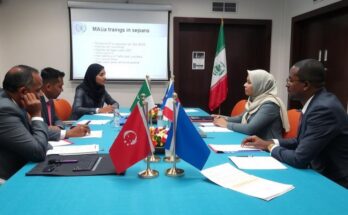Amnesty International’s investigation reveals the utilization of French-manufactured Galix defense systems on UAE-made APCs by the RSF in Sudan, raising concerns of a UN arms embargo violation amid ongoing conflicts that have killed over 23,000 people. The human rights organization calls for an immediate halt to arms supplies to Sudan and stronger enforcement of international sanctions.
Amnesty International recently released a report highlighting the deployment of French-manufactured military technology within the armoured personnel carriers (APCs) utilized by the Rapid Support Forces (RSF) in Sudan. The investigation identifies the Galix System, produced by Lacroix Defense and KNDS France, as a significant component being actively employed in conflict zones, which could represent a breach of the United Nations arms embargo imposed on Darfur. Amidst an ongoing humanitarian crisis marked by severe human rights abuses, Amnesty urges the cessation of all arms transfers to the involved parties in Sudan. The report notes that the Nimr Ajban APCs, manufactured in the United Arab Emirates by the Edge Group, are equipped with the advanced Galix defense system, which is designed to deploy decoys and obscurants to protect military vehicles from threats. Images verified by Amnesty demonstrate that these APCs, prominently used by the RSF, have been documented in combat. Amnesty’s Secretary General, Agnès Callamard, emphasizes the imperative for the French government to intervene and suspend the supply of this military technology to the UAE, given its use in the Sudanese conflict. There is a robust history of military dealings between France and the UAE, with significant arms exports reportedly exceeding EUR €2.6 billion from French suppliers to the UAE between 2014 and 2023. Despite the EU’s arms embargo that has been in effect since 1994, which prohibits military transfers to Sudan, increased vigilance and enforcement of this embargo is critical, especially considering the UAE’s previous infractions with respect to arms regulations. Furthermore, the humanitarian situation in Sudan continues to deteriorate, with recent conflicts resulting in over 23,000 deaths and displacing more than 11 million individuals, marking it as the largest displacement crisis globally. Amnesty International continues to call for the UN Security Council to extend and enforce its arms embargo to encompass all regions of Sudan to prevent further civilian casualties.
The ongoing conflict in Sudan, which escalated in April 2023, has involved severe violence between the Sudanese Armed Forces (SAF) and the paramilitary RSF. This situation has spiraled into a humanitarian catastrophe, with significant civilian casualties and mass displacements. The international community, particularly the European Union, has imposed arms embargoes since the 1990s as a response to human rights violations in the region. However, the discovery of French-made military systems in use by the RSF raises concerns about compliance with international arms control agreements.
The findings from Amnesty International’s recent investigation reveal a troubling intersection of arms transfers and international humanitarian law violations in Sudan. The deployment of the French Galix System within UAE-manufactured APCs by the RSF not only highlights the complex dynamics of modern warfare but also underscores the critical need for stringent enforcement of arms embargoes. Collective international action is necessary to curtail the flow of military supplies to conflict zones to protect civilians and uphold human rights.
Original Source: www.amnesty.org




